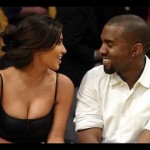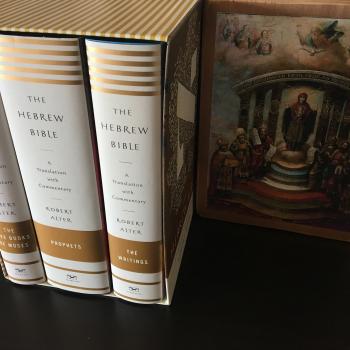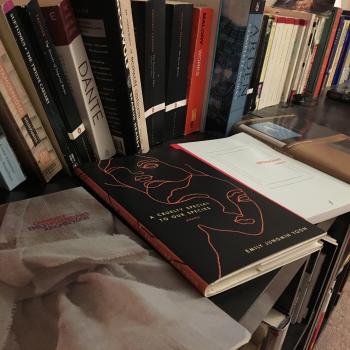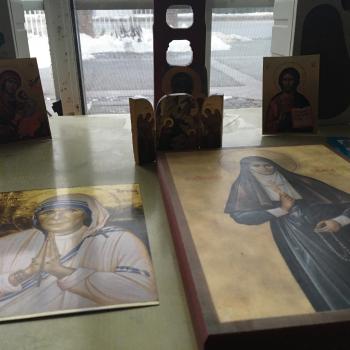I cannot tell you how happy I am that the Vancouver Sun‘s spirituality and diversity columnist Douglas Todd managed to get Tenth Church Vancouver’s senior pastor, the Rev. Ken Shigematsu, on the front page of today’s Christmas Eve newspaper. I have been telling Doug to pay attention to Ken since the former decided to write about me in June. When Ken released a new book on spirituality with Zondervan, we tried to get Doug to write about it. Doug did put a little something on his blog in which he argued that the book promises to break down walls between liberal and conservative Christians.
But now, he has really delivered on that thesis.
As a pastor in the Christian and Missionary Alliance (C&MA;) denomination, Ken Shigematsu is often portrayed as an evangelical, an unusual one to be sure, but an evangelical nonetheless. When I wrote about Ken in Ricepaper Magazine, I followed on the heels of portrayals of the ‘Shiggy routine’ in the Vancouver Courier and the ‘mass exodus’ of second-generation Asian Canadians to his church in Pacific Rim Magazine.
Our portrayals noted that Ken was an unusual evangelical because of his theological breadth. He comes out of a conservative theological framework that emphasizes Jesus Christ’s substitutionary atonement for sin. But he has long had an emphasis on poverty work, so much so that it led to a showdown with Vancouver’s City Hall in 2007-2008 over whether they needed a social services licence to do that work (see also here). And he also has a Doctor of Ministry from Berkeley’s Graduate Theological Union in spirituality, from which his new book, God in My Everything, is derived.
At heart, Ken has been seen as an unusual evangelical who has theological breadth. That is why I am ecstatic to see Douglas Todd situating Ken among liberals for a change today.
As Doug explores Ken’s emphasis on silence and contemplative prayer, he looks to other mainline clergy in Vancouver, such as the Rev. Ellen Clark-King (Archdeacon, Diocese of New Westminster) and the Rev. Jim Smith (Central Presbyterian Church). As Doug notes, both have written books on the neuroscience of prayer, and it seems like talking to them has provided Doug with a wealth of material on the ‘science’ of prayer, from how petitionary prayer can lead to the projection of desire across time and space and how contemplative prayer can expand your brain in a positive way.
By appealing to the natural sciences, Doug is placing Ken’s comments in a liberal Protestant framework. As Pamela Klassen argues in Spirits of Protestantism, ‘liberal Protestantism’ is not the sort of anti-transcendent theology that it has long been caricatured as. It is better situated as a ‘scientific supernaturalism,’ a desire to bring together strands in the natural sciences with the transcendent.
This is not to say that Ken himself is a liberal theologian. Lest one become concerned about his theological standing within the C&MA;, Ken himself doesn’t say much about scientific supernaturalism, preferring to emphasize how Christ might be born in him today. Though this might be Schleiermacher-friendly (which, for the record, wouldn’t have been a problem for Barth), Ken talks a lot in this interview about how he is listening to God. This is a personal God, a God who is a person who is still speaking, a God who speaks in Scripture like the Lord’s Prayer, which means that, really, any conservative evangelical could buy into what Ken is saying.
But by situating Ken amidst liberals–and then getting that on the front page of the Sun—Doug has achieved a marvelous political feat among Christians in Vancouver. Doug himself has often been criticized as ‘liberal,’ taking the side of the liberal Bishop Michael Ingham in the Anglican Diocese of New Westminster’s blessing of same-sex unions while also allegedly portraying Chinese Christians as insular for his Chinese New Year piece in 2011. That Doug has taken some heat suggests that the culture wars are very much being fought on Vancouver’s turf.
However, if Ken Shigematsu can be situated among both evangelicals and liberals because of his theological breadth, then there is hope for the culture wars in Vancouver to come to a halt. As Pope Francis would say, the sickness of ideological forms of Christianity can be cured by prayer. Ken Shigematsu is a man of prayer who teaches his congregation to pray, to listen to God, to have Christ born among them. As Doug’s piece shows, prayer is a practice shared by conservatives and liberals alike.
Indeed, consider this article in the context of Doug’s more recent work on the election of the new bishop for the Diocese of New Westminster, the Rev. Canon Melissa Skelton. As Skelton was elected, she said that Anglicanism attracts evangelicals with its beauty. If that is so, while the culture wars and even the endless cycle revolving around the ‘War on Christmas’ rages, the front page of the Vancouver Sun has called for theological reconciliation around the beauty of contemplation. The putatively secular public sphere has called for ecumenism.
That is why I am ecstatic.
POSTSCRIPT: I have written about Douglas Todd’s philosophical liberalism here.
POSTSCRIPT #2: I am fully aware of the charismatic overtones to the word ‘ecstatic.’
UPDATE: One careful reader who was involved in the activism around Tenth Church’s social services permit in 2007-2008 rightly observes that Faith Communities Committed to Solidarity for the Poor involved a lot of religious communities, while Tenth was the ‘precipitating circumstance.’ This is absolutely correct. I am actively interested in this case for further research, and I would encourage anyone who was part of it to contact me at jkhtse (at) u (dot) washington (dot) edu.












